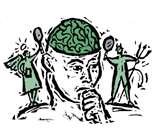Home » CROA Draft Ethics Code
Comment on the Draft Ethics Code For the CRO
 Doctors have an ethics code. PR professionals, accountants, lawyers, ombudsman, engineers and ethics officers all have ethics codes. In many ways, a well crafted ethics code defines a profession; it gives guidance to its practitioners to support the most taxing judgment calls they will have to make and articulates its defining values to those outside the profession.
Doctors have an ethics code. PR professionals, accountants, lawyers, ombudsman, engineers and ethics officers all have ethics codes. In many ways, a well crafted ethics code defines a profession; it gives guidance to its practitioners to support the most taxing judgment calls they will have to make and articulates its defining values to those outside the profession.
Deciding between what is right and wrong can sometimes be difficult. Corporate Responsibility practitioners often have to go further and decide between two rights. We also have occasion to stand between a legally permissible and commercially compelling course of action, but one that is morally wrong and will ultimately impact our business negatively.
Without an ethics code we are alone in tackling both of these defining challenges of our field. Without an ethics code, we are in a job, not a practice and certainly not a profession. Surrounded by peers from other business functions that have professional membership organizations and ethics codes, we will not be able to carry out our role without these things.
With this in mind, the professional development committee of the CROA, together with an advisory support group have developed a draft ethics code to whet your appetite and stimulate discussion across the practice on what we are really all about. It doesn’t focus on philanthropy or sustainability or any other tool of corporate responsibility. Rather it attempts to define values and standards that the practitioner brings to their company and to their peers.
Take a look at the draft below and add your comments. The discussion around the code, which will continue at the CROA conference in Chicago on Novmber 3-4 is as important a part of the process as the final code.
Kevin Moss - Chair of Professional Development Committee
This code provides a set of requirements to which CROA members adhere.
The code reflects the unique role of the CR practitioner to;
- Represent the inter-dependency between a thriving business, a thriving and trusting community and a sustainable environment.
- Practice in the space beyond compliance, recognizing that ‘legal’ does not in itself define ‘good’.
Specific to the CR role, the CR practitioner will, at a level consistent with their role in the organization;
- Develop an understanding of the potential outcomes that result from the impact of the business on society and the impact of the business on the environment.
- Develop an understanding of the wellbeing of society and environment on the business.
- Ensure that those interdependencies are articulated back into the business and accounted for in all business decisions in which the CR practitioner is included
- Ensure that employees in business functions are aware of and account for the impact of their activities on society and the environment as appropriate to their functional role
- Articulate and advocate for the needs of civil society and the environment when a business decision has a consequence in either or both spheres and take a balanced outlook between need for the business to thrive and need for the community and environment to thrive
- Maintain a knowledge of the business in which they operate and a knowledge of social and environmental issues in the short and long term
- Recognize and account for the interrelationship between economic, social and environmental issues.
- Drive for a governance and transparency model that supports a sustainable business,
As an exemplar of the aspiration of the profession the practice the practitioner will’
- Maintain the highest professional standards of Integrity, honesty and ethical behavior
- Advance knowledge in the profession and advocate for the profession
- Avoid any actual, potential, or perceived conflicts between my personal and business responsibilities, and promptly disclose and resolve any issues that may arise.
- Be transparent about any special relationship, business interest or conflict of interest.
Advisory Group:
Professor Tim Fort – The Lindner-Gambal Professor of Bus. Ethics George Washington University
David Nitkin – President, EthicScan Canada
Veronica Cavallaro – Director of Research, Global Corporate Citizenship, The Boeing Company
Marc Terreau - former chair of the Ethics Practitioners' Association of Canada
| Attachment | Size |
|---|---|
| Ethics-Draft.doc | 33 KB |

RE: Ethics Code for CROs
Thanks for voicing your support for this important effort!
Richard Crespin, CROA Executive Director